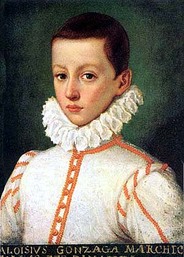
To this fettering of the senses he added torture of the body. He kept three days as fasts in every week and that mostly upon a little bread and water. But indeed he as it were fasted every day, for he hardly ever took so much as an ounce weight of food at breakfast. Often also, even thrice in one day, he would lash himself to flowing of blood with cords, or prick himself with spiked chains. He sometimes used a dog-whip, instead of a scourge, and the rowels of spurs instead of hair-cloth. He privately filled his soft bed with pieces of broken plates, that he might find it easier to wake to pray. He passed great part of the night, clad only in a shirt even in the depth of winter, kneeling on the ground, or lying flat on his face when too weak and weary to remain upright, busied with heavenly thoughts. Sometimes he would keep himself thus for three, four, or five hours, until he had spent at least one without any movement of body or any wandering of mind. Such perseverance obtained for him the reward of being able to keep his understanding quite concentrated in prayer without distraction, as though rapt in God in an unbroken ecstasy. Desiring to give himself up to him alone, he overcame, after a strong opposition for three years, the objections of his father, procured the transfer to his brother of his right to the Marquisate, and joined at Rome the Society of Jesus, to which he had been called by a voice from heaven when he was at Madrid.
In his very novitiate he began to be held a master of all godliness. His obedience to even the most trifling rules was absolutely exact, his indifference to the world extraordinary, and his hatred of self implacable. His love of God was so keen that it gradually undermined his bodily strength . Being commanded to give his mind some rest from thinking unceasingly of God, he struggled vainly to distract himself from him who met him everywhere. From tender love toward his neighbour, he joyfully ministered to the sick in the public hospitals, and in the exercise of this charity he caught a deadly disease. This sickness slowly wore him away, and soon after he had entered on the 24th year of his age, upon the 21st day of June, a day which he had himself foretold, after entreated that might be scourged, and laid upon the ground to die, he passed away to heaven. What the glory is which he there enjoyeth holy Mary Magdalene of Pazzi was enabled, by the revelation of God, to behold, and she declared that it was such as she had hardly believed existed even in heaven, and that his holiness and love were so great that she should call him an unknown martyr of charity. On earth God glorified him by many great miracles. These being duly proved, Benedict XIII inserted the name of this angelic youth in the Kalendar of the Saints, and commended him to all young scholars both as a pattern of innocency and purity, and as a patron.




